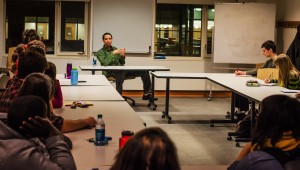By Kelsey Roebuck
roebuckk@grinnell.edu
Visiting speaker Adeyemi Balogun conducted a workshop Tuesday on dismantling white supremacy that ranged from capitalism’s links to racial injustice to slave codes to incarceration rates among African-Americans today. Balogun is a member of the Black Autonomy Federation, an anti-authoritarian organization that concentrates on self-determination for the black community of the United States and the oppressed all over the world. Balogun decided to explore oppression through the intersection of colonialism and economics after reading work by political prisoners. His workshop was entitled “Dismantling White Supremacy: A Decolonization Training.” Vincent Kelley ’16, a member of the campus group Anti-Oppression Peer Education Network (OPEN), invited Balogun to speak at Grinnell after meeting him through their mutual involvement in Deep Green Resistance, a radical environmentalist group.

He said he appreciated Balogun’s unique approach to race in the United States. “I think that a lot of people are under the impression that we live in a post-racial society,” Kelley said. “A lot of times I also think that anti-racism work is often treated as a topic unto itself and is not connected to other systems such as global capitalism.” Balogun’s workshop explored the institutions and philosophies that contribute to that status quo in the United States as well as on a global scale. He began by emphasizing that historic conflicts have yet to be resolved in modern society. “Most people don’t know that, over the last year, more black people have been summarily executed by police than were killed during the height of lynch mob and Klan activity in the early part of the twentieth century,” Balogun said. During Balogun’s workshop, he explained that white supremacy was and is an “institutionally-based” system of oppression used by America and European nations to create and maintain their positions of wealth and power. According to him, white supremacy functions through distorted perceptions. “For white supremacy to function, it must control how people perceive the world,” Balogun said. To prove his point, Balogun analyzed America in the early 1700s. During that time, a substantial working class composed of white indentured servants, native peoples and enslaved Africans posed a considerable threat to the status quo. Following a series of multiracial slave rebellions, the “slave codes” were created to raise the status of indentured servants. According to Balogun, this was also the first time that European servants were referred to as white in an official capacity. As a result, the ruling class weakened their opposition by dividing the working classes along racial lines. “The concept of whiteness is itself rooted in white supremacy,” Balogun said. “It is a culture defined by what you’re not rather than what you are.” From this early point in American colonial history, Balogun drew parallels to more contemporary racial legislation. According to him, the new laws following abolition, called the black codes, essentially made it illegal to be African American, thereby supporting the same system established by the slave codes. “They created a new system of enslavement built on incarceration,” Balogun said. He drew these connections between the transatlantic slave trade and the modern prison system by illustrating that, in the capitalist society that evolved from early colonialism, there is an economic benefit to oppressing groups of people. “Whenever they have implemented something like [the black codes], it has coincided with the expansion of the empire. At the same time they were doing this, they were also creating the reservation system—incarcerating native people,” Balogun said. This pattern of oppression for the economic benefit can be seen in U.S. policy in the last twenty years of violence in Africa. “We are constantly looking to exploit new resources from all over the world,” Balogun said. “That’s why colonialism, it hasn’t changed. It’s good for business to keep certain countries destabilized in order for them to operate mining interests and stuff like that.” As part of the workshop format, Balogun opened the floor for questions and students asked about everything from the status of black women in this colonial enterprise to what methods were being used to combat the this year’s high rate of police brutality against African Americans in Memphis. As Balogun answered these questions he pointed out that, after considering the systematic support system underlying white supremacy, it will take radical institutional and economic change before racism becomes a thing of the past. Balogun recommended organizing to combat capitalism as an inherently corrupt and failing economic institution that perpetuates white supremacy. “Dismantling white supremacy means dismantling capitalism itself,” he said.




























































